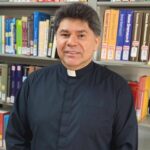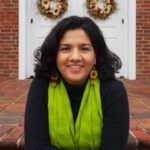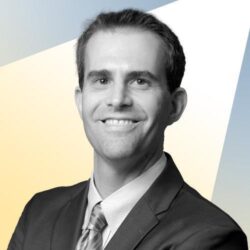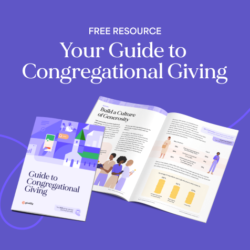Seeing Generosity with New Eyes
Seeing Generosity with New Eyes
Today’s guest writers joined Lake Institute for two special events in Philadelphia earlier this month: an Executive Certificate in Religious Fundraising course offered in partnership with Hispanic Summer Program, and a Community of Practice gathering focused on nurturing generosity in Hispanic/Latinx faith communities.
by Fr. Juan J. Molina Flores
I came away from the gathering of our Hispanic community of practice on fundraising (which took place in Philadelphia the week right after Easter) extremely thankful, both for having learned a lot, and for having made new friends who—like the disciples on the road to Emmaus—are on a similar journey. The gathering brought together practitioners and theologians who engage in fundraising for their organizations or congregations. I already knew that I needed some affirmation of my own ‘theology of money’ (in short that, while important, money is only a means to the much greater end of bringing about the Kingdom of God in my life and in the life of others, and that, if I use it only to help myself, it is not the best or wisest use). But gathering with other theologians and administrators of faith-based nonprofit organizations gave me the boost I truly needed to understand that, when I ask for money on behalf of my organization, what I am really doing is sharing my organization’s mission, grounded in my conviction that this mission is God-given, and inviting others into this mission.
As we study in Christian theology, the church is now on the mission Jesus has given it, with the Holy Spirit to guide us as disciples to accomplish that mission. In modern society, this means using money to help others, to support the sick, to educate the future generations and the ministers of the church, and to advocate for the common good. Understood in this way, sharing your organization’s story, and inviting others to participate in its mission is inspiring and a great tool in evangelization. For me, this insight was a blessing. And to meet others who also believe in the mission of the church, and who work together to find the means to implement this mission, was a greater blessing. I realized I am not alone. I am thankful for having met new co-workers in the vineyard of God and for having deepened friendships with long-time ones.
Secondly, I benefited greatly from the insight that immigrant communities are deeply generous, and that they express their generosity especially by sending money back to their home countries in support of family members. I knew this by intuition. I have even preached about it and encouraged people to see their remittances as acts of generosity, in keeping with the old saying that “charity begins at home.” The gathering also helped me to reflect on ways in which I can encourage and nourish immigrant communities’ generosity here, where they live. How can I help move some members of the immigrant community to also give to causes here in the United States? How do I nurture giving “at home” and “for others”? These questions are complex. As I came to understand, they have several dimensions and several possible answers.
During the gathering, we talked with admiration about how many of our Hispanic, Indian, African, and Caribbean parishioners or congregants tell us they give to help their relatives back home. We noted that this generosity is often mentioned by first-generation immigrants, who speak of it almost as a moral obligation, or as something one is doing out of the feeling that they now need to share the blessings God has given them in this country. At other times, we hear second-generation individuals saying that they are continuing their parents’ tradition of sending something to their ‘abuelitas’ or to the parish or church they had visited when their parents would take them back for summer or holiday visits. Many parishioners speak of these gifts as important to them and to their identity, as well as to the society where they or their parents grew up.
We also identified other ways in which our immigrant congregations and organizations express their generosity. For example, many pastors spoke of how, sometimes, small groups would begin an effort to pay for the funeral costs of a parishioner, or to send the remains of a parishioner back to their home country. And, of course, there are also the initiatives to help a child go to high school or to college. Sometimes these initiatives are to make sure that a child is the first one in their family to go to college. No wonder the “back-to-school backpacks” initiatives are so popular!
Yet, the questions remained: How can I help stir the heart of some members of the immigrant community to also give to causes here in the United States? How do I nurture both giving “at home” and “for others?” Again, it is always good to emphasize that “charity begins at home,” and to support and encourage giving to relatives or individuals or groups closest to a person. At the same time, we can encourage more generosity to the “back-to-school backpacks” or to the “food drive” for the Thanksgiving holidays. Then we can begin to speak of other organizations that are trusted and do well with the resources they are given, as a first move to be generous “here” in one’s new homeland. And we can build from there, one step at a time.
In short, I am deeply thankful for the friendships I made and renewed, and for the insights that I gained from Lake Institute’s Community of Practice for Hispanic Fundraising Leaders.
 Fr. Juan Molina, a priest of the Archdiocese of San Antonio, is the fifth President of the Mexican American Catholic college (MACC). Fr. Molina has served in parish ministry and in various organizational positions at Catholic Relief Services and the United States Conference of Catholic Bishops. He holds several master’s degrees, a Ph.D. and is a published author.
Fr. Juan Molina, a priest of the Archdiocese of San Antonio, is the fifth President of the Mexican American Catholic college (MACC). Fr. Molina has served in parish ministry and in various organizational positions at Catholic Relief Services and the United States Conference of Catholic Bishops. He holds several master’s degrees, a Ph.D. and is a published author.
Expanded Perspective: Love for Humanity
by Talina Sarmiento Beck
From April 3 – 6, I gathered with other Hispanic faith leaders in Philadelphia at El Semillero. An initiative of the Hispanic Summer Program, El Semillero is a networking and training event that empowers Latinx theological leaders to build sustainable and equitable institutions that impact Latinx communities. El Semillero partnered with Lake Institute on Faith & Giving to teach us principles of fundraising, finances, and development.
My visit to El Semillero started with reflections on generosity. Characteristically, our conversations as Hispanic leaders included memories of our childhood, moms, dads, abuelitas, the community, and our way of life growing up. We remembered the generosity of the ones who raised us, who didn’t have much but always had extra food for visitors. Some recalled the many times they gave up their beds for the missionaries who visited their town. I remembered the many times I saw mi abuelito buying from the sellers on the streets something he didn’t need for the sake of helping others make a living. I realized that although many of our memories did not include money, a spirit of generosity was present in the ways we were taught to love and care for others.
We came to El Semillero in need of ideas and training to make our organizations and ministries sustainable. We learned valuable strategies for fundraising, nurturing relationships, and cultivating the generosity of donors so that collectively we could make an impact in our communities and participate in the work of God. I also learned about the meaning of philanthropy.
Philanthropy Means Love for Humanity
Latinx communities show our love for others by using our talents to care for those in need. In the daily struggle of working double shifts with minimum salaries, many in our communities provide for crowded tables that always have space for an extra placemat. We use financial resources to support others in need, including many loved ones here and in our countries of origin.
I learned the need and the call for Latinx faith leaders to recognize and celebrate the many ways that Latinx communities are already showing generosity and love for humanity. Looking back at our shared history helped me to recognize the pain and the trauma that we as a people carry. Acknowledgment is the first step to healing trauma. Leaders are called to nurture philanthropy to fund the vision of a world where no charity would be needed because everyone would have the same opportunities to thrive.
Religious fundraising means inviting those around us to love humanity like the philanthropists in the story of the Good Samaritan in Luke 10. The Good Samaritan hears and sees the pain of a man who was robbed and wounded. He recognizes the injustice and the trauma, and he loves enough to care for him. As a Good Philanthropist, the Good Samaritan uses his financial resources to provide for the healing that the wounded man needs. He funds the innkeeper who seems not to have financial resources but offers his gifts of care to heal the wounded man. The Innkeeper and the Good Samaritan (or Good Philanthropist) together illustrate the spirit of generosity needed to heal the traumas of our people. My time at El Semillero reminded me of this very spirit of generosity that our communities have long carried. No matter which community we grew up in, we all are called to participate in the healing God is doing with this spirit of generosity that God calls us to develop.
 Talina Sarmiento Beck was born and raised in Mexico City. She holds a bachelor’s degree in International Business. She is also a graduate from Wesley Theological Seminary, in Washington, D.C. where she received her Master of Theological Studies (MTS). She is a member of the United Methodist Church and is a deacon candidate in the Virginia Conference. She is also a founder and part of the Executive Committee of the HSP Alumni Network. She works for the Chesterfield County Public Libraries and lives with her family in Chester, VA, where she enjoys spending time outdoors and practicing mindfulness in every possible way.
Talina Sarmiento Beck was born and raised in Mexico City. She holds a bachelor’s degree in International Business. She is also a graduate from Wesley Theological Seminary, in Washington, D.C. where she received her Master of Theological Studies (MTS). She is a member of the United Methodist Church and is a deacon candidate in the Virginia Conference. She is also a founder and part of the Executive Committee of the HSP Alumni Network. She works for the Chesterfield County Public Libraries and lives with her family in Chester, VA, where she enjoys spending time outdoors and practicing mindfulness in every possible way.
Podcast: Reimagining Giving Traditions
 In this “Leading and Thriving in the Church” podcast episode, Dr. Prince Rivers of Alban at Duke Divinity School talks with David P. King. As an American religious historian, his research interests broadly include exploring the practices of 20th- and 21st-century American and global faith communities as well as more specifically investigating how the religious identity of faith-based nonprofits shapes their motivations, rhetoric, and practice.
In this “Leading and Thriving in the Church” podcast episode, Dr. Prince Rivers of Alban at Duke Divinity School talks with David P. King. As an American religious historian, his research interests broadly include exploring the practices of 20th- and 21st-century American and global faith communities as well as more specifically investigating how the religious identity of faith-based nonprofits shapes their motivations, rhetoric, and practice.
In this conversation, Prince and David discuss:
- Post-COVID giving trends in congregations
- What churches with strong stewardship cultures have in common
- Why pastors need to understand money and stewardship.
Energize Your Giving
 We’re excited to share Givelify’s new Guide to Congregational Giving, an actionable workbook developed for faith leaders like you.
We’re excited to share Givelify’s new Guide to Congregational Giving, an actionable workbook developed for faith leaders like you.
Grounded in the latest research from the 2024 Giving in Faith report, this guide offers exclusive insights, practical strategies, and simple exercises to help drive consistent giving year-round.
Explore how to:
- Nurture a culture of faithful generosity
- Build support for outreach programs
- Leverage technology and digital giving
- Strategically plan for the year
Inside, don’t miss the exclusive 2024 giving calendar planner with special observances and holidays to enhance your annual giving strategy!
Subscribe
Insights, a bi-weekly e-newsletter, is a resource for the religious community and fundraisers of faith-based organizations that provides:
- Reflections on important developments in the field of faith and giving
- Recommended books, studies and articles
- Upcoming Lake Institute events

